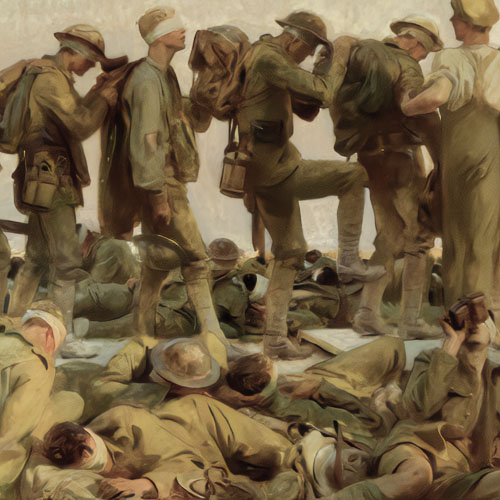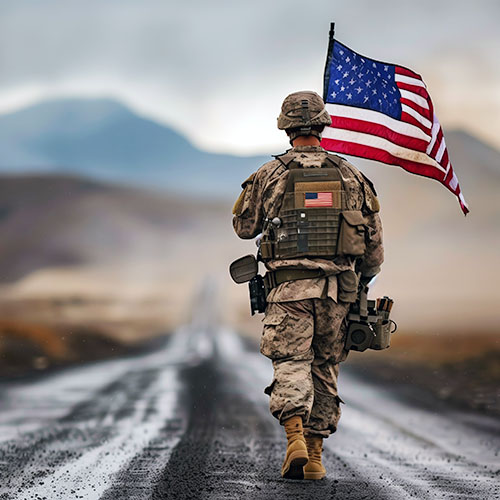More than a century after the American Civil War ended, U.S. military bases still sport the names of dead Rebel generals. Is it time for a change?
What Gives with the Confederate Names?
If you’re able to clear away the smoke and tear gas of 2020 — no easy feat, mind you — a loose, central question to much of all this noise is: Why should things stay this way just because they’ve always been this way? Social issues running the gamut from policing to statues of dead people in parks to names of programs at universities have brought to the forefront demands for immediate change and action during this, our 21st-century Summer of Rage.
Now, other than the ideologues and frothing maniacs, any thinking person will be for some changes and against others (I’m all for bringing down Bob Lee monuments while leaving General Grant’s marble heads untouched, myself). It doesn’t always come across on Twitter, but most of us are complex and contain multitudes, and all that sweet Walt Whitman philosophical jazz I’ve gone on about here before.
Which brings me to the curious case of United States military bases named after war generals of the Confederacy.
Some 160 years after the Civil War’s outbreak, Confederate Names remain on ten bases in the States, all belonging to the U.S. Army, and all located in the American South. They are: Camp Beauregard (Louisiana), Fort Benning (Georgia), Fort Bragg (North Carolina), Fort Gordon (Georgia), Fort A.P. Hill (Virginia), Fort Hood (Texas), Fort Lee (Virginia), Fort Pickett (Virginia), Fort Polk (Louisiana), and Fort Rucker (Alabama). Benning and Bragg, in particular — are institutional centerpieces of the modern Army, home to the Infantry and 82nd Airborne, respectively.
The vast majority of these forts and bases were founded and named in the early 20th century, either during World War I (when America quickly mobilized large training areas for its draftees and volunteers) or around the onset of World War II. For reasons somewhat similar to how many of the Confederate memorials went up decades after the Civil War’s conclusion (the Lost Cause generation, yeehaw!!!), these bases’ namings served purposes beyond honoring dead men’s service to country. (Or countries, in these cases — important to remember that these men all served the U.S. Army before 1861 and resigned their commissions then if they were still on active duty.)
What were those reasons? One example ran in the August 16, 1918, edition of the Greensboro Daily News. According to a letter from an unnamed “official source in Washington,” the name Bragg honored Braxton Bragg, “the only native of this state to reach the rank of full general in the Confederacy.” Some of Bragg’s Civil War highlights are also mentioned, though his broader historical legacy as a poor leader and strategist goes curiously unmentioned. A contemporary retired general, David Petraeus, recently wrote in The Atlantic:
“Bragg’s temper was so bad, Ulysses S. Grant recounted in his memoirs, that an old Army story had a superior once rebuking him, ‘My God, Mr. Bragg, you have quarreled with every officer in the army, and now you are quarrelling with yourself!’ Bragg’s inability to cooperate diluted his effectiveness until his resounding defeat at the Battle of Chattanooga, in November 1863, precipitated his resignation from the Confederate army.”
Now, though I’m a Westerner, I’m also a Yankee, through and through, and will admit to gleefully calling the Confederate names traitors and losers in my off time. I’ve been in shouting matches with military friends over this and tangentially related issues, and will gladly do it again, when the time comes. That qualifier aside, it’s vital to point out, I think, that 2020 is not 1918. There was a purpose to honoring local military veterans back then, and it didn’t just have to do only with sanitizing the Civil War. It revolved around the nature of reconciliation, and the pursuit of it.
It seems goofy, even sad, to think of now, but much of the (white) post-Antebellum South considered itself a country adrift, even apart, from the USA. The city of Vicksburg, Miss., didn’t celebrate the Fourth of July for 81 years after its surrender to General Grant in 1863, as one infamous example. This is not to dismiss the very real and very stark betrayal of Southern African-Americans that occurred by ending Reconstruction early — that is a stain that forever belongs to this country — but to point out that the motivations in naming Fort Bragg, Fort Gordon, etcetera, decades later weren’t impure in intent.
Sanitized or not, attempts to reconcile a still fractured country were coming from a decent-enough place. An important one, too, on the eves of world wars where every able-bodied American son would be needed to carry a rifle abroad, Northern and Western and Eastern and Southern young men marching and fighting together, as one again.
But. (“Embrace the Suck” columns always have a but, dear reader.) Intent is only piece of the puzzle. Effect matters just as much, if not more so. And the effect of these Confederate names in 2020 can be viewed in a way 1865 and 1918 and 1942 didn’t allow for. The purpose of the reconciliation overtures of yesteryear have been achieved. (For the most part. Who doesn’t have a Southern friend who still goes on about the “War of Northern Aggression” after a few beers.) And as we’re seeing in 2020, these names and monuments have had a real and profound role in causing minority groups of Americans, blacks especially, to feel apart from their own nation.
Is that good enough? Is that good enough for Abe Lincoln’s imperfect Union hell-bent on bettering itself every day, every year, or for a military made up of 17 percent African-Americans? They’re just names, you say? Names represent not just who we’ve been and where, but where we’re going, and what we aspire to be.
I’m just a guy with a column, but Forts Alywn Cashe, Robert Smalls, and Harriet Tubman all have a good ring to them, whether they’re for renamed bases or future ones. This wouldn’t solve all of 2020’s concerns. But it’s a start.
Matt Gallagher is a U.S. Army veteran and the author of three books, including the novel Empire City (Simon & Schuster, $27.00).























